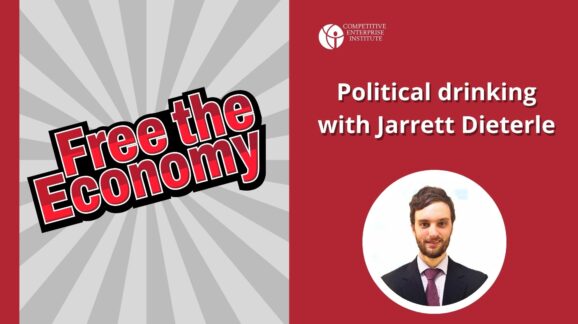There are two main areas in which Congress can enact meaningful reform. The first is to rein in regulatory guidance documents, which we refer to as “regulatory dark matter,” whereby agencies regulate through Federal Register notices, guidance documents, and other means outside standard rulemaking procedure. The second is to enact a series of reforms to increase agency transparency and accountability of all regulation and guidance. These include annual regulatory report cards for rulemaking agencies and regulatory cost estimates from the Office of Management and Budget for more than just a small subset of rules.
In 2019, President Trump signed two executive orders aimed at stopping the practice of agencies using guidance documents to effectively implement policy without going through the legally required notice and comment process.
Featured Posts

Blog
Free the Economy podcast: Political drinking with Jarrett Dieterle
In this week’s episode we cover student loans, revenue from tariffs, democracy in Hong Kong, and the impact of podcasts…

Blog
From cuts to costs: Why federal paperwork keeps piling up
The Office of Management and Budget’s (OMB) release of the 2023 Information Collection Budget (ICB) paints a troubling picture of not just of growing federal…

Blog
This week in ridiculous regulations: Mergers and mail
The 2024 Federal Register topped 90,000 pages and is now the second-longest ever, dating back to 1936, with more than a month still to go.
Search Posts
Op-Eds
Clinton’s Midnight Madness vs. the Bush Administration
Remember all those “<?xml:namespace prefix = st1 ns = “urn:schemas-microsoft-com:office:smarttags” />midnight regulations” finalized by outgoing Clinton administration officials during their final two months…
Op-Eds
No, Not the NHS!
Whenever I hear the words “universal health care” — as I did during Sunday night's Democratic debate in <?xml:namespace prefix = st1 ns =…
Op-Eds
End Subsidies for Nanotechnology
Op-Eds
UN-Dermining the Net
There's mounting evidence that the Internet's good old days as a globalcyberzone of freedom—where governments generally take a “hands off” approach—may be numbered. [Last year] delegates from 192 countries met in <?xml:namespace prefix = st1 ns = “urn:schemas-microsoft-com:office:smarttags” />Geneva to discuss how the Internet should be governed and what steps should be taken to solve the global “digital divide” and “harness the potential of information” onbehalf of the world's poor. Also on the table at the session—the UnitedNations World Summit on the Information Society—was the question of domainname management and how much protection free speech and expression shouldreceive on the Net. The real issue, however, is whether a “United Nations forthe Internet” is on the way. The great advantage of the Net is precisely the ability to reach as many peopleas possible and overcome artificial restrictions on trade or communications attraditional geographic boundaries. The Web, whatever problems it has raised,has provided far more opportunity and freedom to mankind. The United Nationsappears eager to assume greater control over the Net, not because of itsfailures, but because it undermines members' authority. That sounds like thebest reason ever to make sure a United Nations for the Internet never becomes areality. …
Op-Eds
Everybody Wants to Rule the Web
There’s mounting evidence that the Internet’s good old days as a global cyberzone of freedom—where governments generally take a “hands off” approach—may be numbered.
Op-Eds
Taxing Fat, Killing Jobs
Dark clouds of uncertainty now hover over the future of some 26,000 European companies and their 2.6 million employees. These firms represent Europe’s food…
Op-Eds
France Launches Global Culture War
Cultural creativity is big business in <?xml:namespace prefix = st1 ns = “urn:schemas-microsoft-com:office:smarttags” />America. According to the most recent data from Economists Incorporated, U.S.
Op-Eds
Corporate PR Must Reach People as Consumers and Citizens
PR pros have long sought to link their efforts to clients’ return on investment. The planned campaign for the Aluminum Association, detailed in this magazine…
Op-Eds
The Green Machine
Click on pdf link above to obtain full version of article Twenty EU member and accession states labour under a cadre…
Op-Eds
Russian Revolution
On <?xml:namespace prefix = st1 ns = “urn:schemas-microsoft-com:office:smarttags” />December 2, 2003, Andrei Illarionov, Russian President Vladimir Putin's chief economic adviser, stunned green activists…
Op-Eds
Resentment, fear drive U.N. quest for control
There’s mounting evidence that the Internet’s good old days as a global cyberzone of freedom—where governments generally take a "hands off" approach—may be numbered.
Op-Eds
Wishful Anti-spam Thinking
Tomorrow, the House is expected to pass new anti-spam legislation. The effort is understandable: The increasingly apparent downside of an Internet on which you…
Op-Eds
Rescuing Free Trade From the Bureaucrats & Special Interests
Full article available in pdf format.<?xml:namespace prefix = o ns = “urn:schemas-microsoft-com:office:office” /> In the aftermath of the…
Study
The Power of Positive Drinking: Are Alcoholic Beverage Health Claims Constitutionally Protected
Full Document Available in PDF Food and…
Products
October Edition of the Monthly Planet
Full Document Available in PDF Articles in this edition: “On…
Op-Eds
United Nations Day of Shame
UN Secretary-General Kofi Annan recently declared that the global pursuit of scientific endeavors is marked by inequality. Noting that developing countries invest much…
News Release
General Accounting Office Reports on Cable TV Rates
Contacts: <?xml:namespace prefix = o ns = “urn:schemas-microsoft-com:office:office” /> Ms. Solveig Singleton, 202.331.2274, [email protected]…
Study
Federal Pesticide Law Needs an Overhaul: Anti-Competitive Effects Hit Consumers, A Case Study
Full Document Available in PDF Most Americans believe that the federal regulatory process is simply designed to protect them from fraud and…
News Release
International Airline Deregulation
Click here to visit the Kojo Nnamdi Show’s Web site.<?xml:namespace prefix = o ns = “urn:schemas-microsoft-com:office:office” /> …
Op-Eds
Vox Populi and Public Policy
“How can you tell whether a whale is a mammal or a fish?” a teacher asks her third-grade class. “Take a vote?” pipes…
News Release
Court Verdict Threatens Future of Internet
<?xml:namespace prefix = st1 ns = “urn:schemas-microsoft-com:office:smarttags” /> Washington, D.C., October 8, 2003—A federal court decision this week has thrown the commercial future…
Op-Eds
Are Small Particles Such a Big Problem?
According to the Environmental Protection Agency, small particles in the air pose the greatest threat that it or any other regulatory agency is…
Op-Eds
Running Away From Safety
Remember Jim Fixx? Not many people do, and that's a shame. Fixx was a jogging guru who ran 60 miles a week. He…
News Release
Anti-Globalization Movement in Retreat in Cancún
The Anti-Globalization Movement is in retreat at the World Trade Organization’s (WTO) Ministerial meeting; and advocates of open trade now have an opportunity to make…
News Release
NGO Media Briefing featuring Fred Smith and Myron Ebell
NGO Media Briefing<?xml:namespace prefix = o ns = “urn:schemas-microsoft-com:office:office” /> Environmental and Fair Trade Linkages: Threats…
News Release
Media Deregulation Takes a Troubling Hit
Contact for Interviews: <?xml:namespace prefix = o ns = “urn:schemas-microsoft-com:office:office” /> <?xml:namespace prefix = st1 ns = “urn:schemas-microsoft-com:office:smarttags” />Richard Morrison, 202.331.2273…
Op-Eds
Down the Tube
The first elected Mayor of England's capital city, Ken Livingstone, has seen his transportation policy descend into chaos in recent weeks. Londoners regularly…
Op-Eds
Europe’s REACH Exceeds Its Scientific Grasp
European regulatory officials have raised hostility to technological innovation to an art form. Their current medium of choice is the Precautionary Principle, which holds…
Op-Eds
Europe ‘Reaches’ for Disaster
European regulatory officials have raised hostility to technological innovation to an art form. Their current medium of choice is the Precautionary Principle, which…
News Release
New Chance for Local Telephone Competition
<?xml:namespace prefix = st1 ns = “urn:schemas-microsoft-com:office:smarttags” /> Contact for Interviews: <?xml:namespace prefix = o ns = “urn:schemas-microsoft-com:office:office” /> Richard Morrison,…
News Release
Connecticut Official Worsens Blackout Worries
Contact for Interviews: <?xml:namespace prefix = o ns = “urn:schemas-microsoft-com:office:office” /> Richard Morrison, 202.331.2273 …
Op-Eds
A Bright Idea: Deregulate
The massive blackout that shut off lights along the East coast, <?xml:namespace prefix = st1 ns = “urn:schemas-microsoft-com:office:smarttags” />Midwest and Canada need not…
News Release
Bush’s Choice for EPA Chief Lost Opportunity?
Contact: Jody Clarke, 202.331.2252<?xml:namespace prefix = o ns = “urn:schemas-microsoft-com:office:office” /> <?xml:namespace prefix = st1…
Op-Eds
Time to Put Auntie Beeb Out to Grass
<?xml:namespace prefix = v ns = “urn:schemas-microsoft-com:vml” /><?xml:namespace prefix = o ns = “urn:schemas-microsoft-com:office:office” /><?xml:namespace prefix = w ns = “urn:schemas-microsoft-com:office:word” />The current spat…
News Release
CEI’s President Makes the Case to Tame Regulatory Beast
Contact for interviews: Richard Morrison, 202-331-2273 Washington, D.C., July 22, 2003—Today the House Committee on Government Reform will hear testimony from Competitive Enterprise Institute President…
Op-Eds
‘Spammers’ Ignoring Anti-Spam Legislation
Dear Editor: If you look closely at the spam filling your inbox, you might notice one or two…
Study
Cowboys Versus Cattle Thieves
Full Document Available in PDF Fred L. Smith, “Cowboys Versus Cattle Thieves,” in…
News Release
Merrill Lynch Rulings Show Serious Flaws in Wall Street Research Settlement
Contact for Interviews:<?xml:namespace prefix = o ns = “urn:schemas-microsoft-com:office:office” /> Jody Clarke, 202.331.2252<?xml:namespace prefix = st1 ns = “urn:schemas-microsoft-com:office:smarttags” />Washington, D.C.,…
News Release
Broadcast of “Corporate Aftershock” Book Forum
Watch a webcast of the forum on the new book, Corporate Aftershock: The Public Policy Lessons from the Collapse of Enron and Other Major…
Op-Eds
Manager’s Journal: What Media Monopolies?
AN ODD-BALL COLLECTION of special interests are patting themselves on the back this week after convincing the House of Representatives to scale back…
Op-Eds
Biotech Woes…and the Culprits
<?xml:namespace prefix = st1 ns = “urn:schemas-microsoft-com:office:smarttags” />America learned long ago that what's good for General Motors isn't necessarily good for the country.
Op-Eds
Stop This Today! Unsolicited E-mail vs. Unsolicited Legislation
<?xml:namespace prefix = v ns = “urn:schemas-microsoft-com:vml” /><?xml:namespace prefix = o ns = “urn:schemas-microsoft-com:office:office” /><?xml:namespace prefix = w ns = “urn:schemas-microsoft-com:office:word” />In a…
News Release
CEI Files Comments on Proposed Travel Regulations
Full comments available in pdf format.<?xml:namespace prefix = o ns = “urn:schemas-microsoft-com:office:office” /> Contact for Interviews: …
News Release
FCC Should Repeal Media Ownership Rules
Contact for Interviews:<?xml:namespace prefix = o ns = “urn:schemas-microsoft-com:office:office” /> Jody Clarke, 202.331.2252 Washington, D.C., May…
Op-Eds
OMB OTL? What good is a sleeping watchdog?
What would you do if federal lawmakers proposed increasing annual taxes by $8,000 per household? You, and many other taxpayers, would likely retaliate in…
Products
April/May edition of CEI’s Monthly Planet
Full Document Available in PDF Article in this edition:…
Op-Eds
Avoid More Mandates
As more and more Americans become investors, paternalistic regulators are demanding greater disclosure by mutual funds to protect consumers from excessive brokerage commissions…
Citation
Help Wanted
News Release
CEI President Urges DOT to Reduce Regulation of Online Travel Services
Today the Department of Transportation (DOT) is holding a public hearing regarding the latest review of its restrictions on computer reservations systems (CRSs).
News Release
Opportunity for Revolution at EPA
Contact for Interviews: <?xml:namespace prefix = o ns = “urn:schemas-microsoft-com:office:office” /> Richard Morrison, 202.331.2273 <?xml:namespace prefix…
Op-Eds
Junk Laws Can’t Cut the Spam
Unsolicited commercial junk email, or “spam,” is a huge problem. Especially the porn; I have to shoo my children out of the room whenI check my e-mail. But junk legislation offered up to presumably solve the problem can make things worse. Touted at an unsolicited press conference last week, Sen. CharlesSchumer, New York Democrat, proposed legislation that would imposesubject-line labeling requirements for commercial e-mail (it wouldhave to say “ADV”); forbid concealing one's identity; mandate an”unsubscribe” mechanism; ban the use of software capable ofcollecting e-mails from the Internet; set up stiff non-compliancefines; and establish an expensive (and likely hackable and thus worse-than-useless) Do-Not-Spam list at the Federal TradeCommission. Of course, politicians exempt themselves as possibleoffenders under anti-spam legislation, remaining free to send usjunk campaign material. The downside to an Internet in which you can contact whomever youwant, is that anyone can contact you. Spammers pay no postage orlong-distance charges. The solution is to shift those costs back tothe spammer; the question is whether to do that is legislatively ortechnologically. Plainly, peddling fraudulent merchandise or impersonatingsomebody else (such as a person or organization like AOL) in the e-mail's header information should be punished, as should breaking anagreement made with an Internet service provider (ISP) thatprohibits bulk mailing. But in the debate over the outpouring of spam, it's important toavoid unintentionally stifling beneficial e-commerce. Regulatingcommunications isn't something to be done lightly. If a law merelysends the most egregious spammers offshore to continue hammering us,that may simply create legal and regulatory hassles for smallbusinesses trying to make a go of legitimate e-commerce, or formainstream companies that are not spammers. Commercial e-mail, evenif unsolicited, may be welcome if the sender is a business sellinglegal and legitimate products in a non-abusive manner. As the market works to shift costs of commercial e-mail back tothe sender, we must be on guard against legislative confusion inapproaches like Mr. Schumer's: How might the definition of spamexpand beyond unsolicited and commercial e-mail? What about unsolicited political or nonprofit bulk e-mailings,press releases, resume blasts and charitable solicitations? Whatabout newsletters that contain embedded ads? Or what about one'spersonal e-mail signature line with a link back to one's employer?That's a subtle solicitation, whether we admit it or not. At thevery least, unwise legislation would create serious headaches fornoncommercial e-mailers like nonprofit groups. Would pop-up adsbecome suspect in the aftermath of spam legislation? They're not e-mail, but they are unsolicited and commercial. Finally, legal bans on false e-mail return addresses, as well asbans on software capable of hiding such information, have worrisomeimplications for free speech and anonymity for individuals, and willbe ignored by spammers anyway. Well-meaning individuals can use”spamware” to create the contemporary version of the anonymousflyers that have played such an important role in our history.Individuals should retain the ability to safeguard their anonymityeven in (or perhaps especially in) a mass communications tool like e-mail. In an era in which so many people are concerned about onlineprivacy, a law that impedes a technology that can protect suchprivacy would be curious indeed. Smarter approaches to the spam epidemic include better e-mailfiltering, such as setting the owner's screen to delete bulk mailand to receive only from recognized and approved e-mail addresses.That's particularly appropriate for children's e-mail accounts.Emerging “handshake” or “challenge and response” systems capable oftotally blocking spam show promise: Because the most offensive spamis sent by automatic bulk-mailing programs that are not capable ofreceiving a reply, spam no longer appears in the in-box. Identifiers or “seals”' for trusted commercial e-mail could beanother means of helping ISPs block unwanted e-mail. A newconsortium including America Online, Microsoft, and Yahoo, toestablish “certified” e-mail would bolster this approach. Given the perfectly understandable desire to stop unsolicited e-mail, it is all too easy for Congress to undermine legitimatecommerce, communications and free speech. And crippling Internetcommerce would be especially pointless if spam continued pouring infrom overseas. A better target is unsolicited press conferences,like the one at which Mr. Schumer dropped his bill. $25,000 fine, atleast. Send payment to [email protected]. <?xml:namespace prefix = o ns = “urn:schemas-microsoft-com:office:office” />…
Op-Eds
When Molecules Fly
Should the federal government fund scientific research with taxpayer dollars? Boondoggles like the Superconducting Supercollider, the space station, energy research programs, the Supersonic…
Op-Eds
Real-Time Dragnet: Cracking down on Internet innovation
“To serve and protect” is a longstanding slogan of police departments everywhere. It’s also an accurate description of a political dragnet against e-commerce, a scenario…
Op-Eds
Utopian Policymaking: The Inherent Dangers of “Inherently Safer Technology”
What would you say if the federal government proposed phasing out large commercial airplanes? After all, they could argue that using only small planes with…
Citation
Few Groups Challenge Regulatory Data Under Act
CEI Planet
February Edition of CEI Monthly Planet
Full Document Available in PDF Articles in this edition:…
News Release
New Federal Rule on Alcohol Ads and Public Health
<?xml:namespace prefix = st1 ns = “urn:schemas-microsoft-com:office:smarttags” />Washington, D.C., February 28, 2003—Today the U.S. Treasury’s Alcohol and Tobacco Tax and Trade Bureau (formerly…
News Release
New SEC Rules Create Added Costs, Little Benefits
Washington, D.C., January 29, 2003 – Despite opposition from many sources, the Securities and Exchange Commission recently adopted new rules on forced disclosure…
News Release
Environmental, Other Regulations Under Scrutiny
Washington, D.C., December 20, 2002—From energy conservation standards for washing machines to labels on genetically modified food, many federal regulations are coming…
Study
How to Drive Competition in a “Deregulated” Market
View Full Document as PDF…
Op-Eds
EPA’s $32 Trillion Negligible Risk
It is no surprise that federal agencies often tailor their interpretation of the facts and the law to support various policy goals. It should…
Study
CEI Senior Fellow Publishes New Book On EPA’s Regulatory Enforcement
Out Of Bounds, Out Of Control: Regulatory Enforcement At The EPA CEI Senior Fellow James DeLong Publishes New…
Products
August/September 2002 Edition of CEI Update
Full Document Available in PDF Articles in this edition: “Nothing But Hot…
Op-Eds
Getting The Rails Back On Track
As the recent crash of an Amtrak passenger train in Maryland illustrates, our nation's railroad tracks are in dire need of maintenance or replacement.
Citation
Accounting Rules Still Should Adopt to New Economy
Products
June/July 2002 Edition of CEI Update
Full Document Available in PDF Articles in this edition: “Daniels In The…
Op-Eds
Electricity Restructuring Is No License For Central Planning
Economists sometimes gets confused—specially when the real world doesn't fit into their…
Business Week
Harvey Pitt: Thunder to the Left, Thunder to the Right
Op-Eds
Laws Can’t Protect Kids from Porn
When it comes to protecting kids from porn on Internet Web sites, should “community standards” apply that would restrict materials regarded by the…
Business Week
New Laws are Unnecessary
Politicians of all stripes are rushing into the Enron fray, eager to use this event as the pretext for enacting new regulations and laws against…
Op-Eds
New Laws Are Unnecessary
Politicians of all stripes are rushing into the Enron fray, eager to use this event as the pretext for enacting new regulations and…
News Release
Nation Goes Back To Work Of Economic Recovery
Washington, D.C., September 20, 2001— The terrorist attacks of last week have left a heavy burden on the United States – psychologically, politically,…
News Release
Wall Street Journal Advises President Bush to Follow CEI’s Lead on Regulatory Reform
Review & Outlook Father Knows Best As commander in chief, George W. Bush now outranks his dad. But there are still things he…
Op-Eds
Old Law vs. The New Economy: How New Deal-era Regulations Stifle Flexible Work Arrangements
Delong Article Published In Reason Magazine<?xml:namespace prefix = o ns = “urn:schemas-microsoft-com:office:office” /> In August 1997, a certain Mr. T. Trahan of CSC…
Comment
Michael Greve Testifies on Internet Sales Tax Issue
View Full Document as PDF Michael S. Greve cites CEI research in his testimony on Internet sales taxation before the U.S. Senate…
Op-Eds
Second Wind for the Global Economy: Kemp Nationally Syndicated Column
Copyright 2001 Copley News Service Kemp Column Distributed by Copley News Service July 9, 2001 Even as the…
News Release
Cost of Government Day
The Deadly Cost of Fuel Economy Regulations Statement of Sam Kazman, General Counsel Competitive Enterprise…
News Release
White House Listening on Regulatory Reform
Washington, DC, June 29, 2001 — With the fight over taxes over for now, the Bush Administration may soon be taking a hard…
News Release
Federal Court Dismisses Alcohol Advertising Case
Washington, DC, June 26, 2001— A federal district court last week dismissed a challenge to a federal agency’s ban on advertising the medical…
News Release
Little-Known Regulations Contribute to Cost of Government
Washington, DC, June 19, 2001 — Many American know that they must work, on average, from January 1 to May 3 (Tax Freedom…
News Release
Benefits of Moderate Alcohol Consumption to Get Their Day in Court
Washington, DC, June 11, 2001— The Competitive Enterprise Institute and Consumer Alert will present their case for freedom of speech in alcohol labels…
News Release
Statement from CEI President Fred Smith Regarding New CBO Report on Fannie Mae and Freddie Mac
Washington, DC, May 23, 2001 – The latest figures from the Congressional Budget Office indicating that Fannie Mae and Freddie Mac receive more than $10…
News Release
Washington’s 10,000 Commandments Place Heavy Burden on American Families
Washington, DC, May 21, 2001 — The Competitive Enterprise Institute today released the study 10,000 Commandments: An Annual Policy Maker’s Snapshot of the…
News Release
Public Interest Group Criticizes Attack on OMB Nominee
Washington, D.C., March 13, 2001—The Competitive Enterprise Institute is accusing critics of the Administration’s new Office of Management and Budget nominee, John D.
Business Week
Tax Cut Fast Track
Virtually everyone agrees that George W. Bush confronts a rapidly weakening economy as he assumes the presi- dency. Cutting marginal tax rates was at the top…
Business Week
Tax Reform Can be Everyone’s Agenda
While the marathon presidential election in Florida grinds to a conclusion, in Washington, D.C., members of Congress returned in lame-duck session to finish up this…
Business Week
In Obscurity, Clinton Regime Saves Worst Regulations for Last
Americans have developed a fetish-like fixation on the “first hundred days” of incoming ‘administrations in the era of promise-us-everything politics. They use the honeymoon period…
Op-Eds
With Cheney, Smart Economics in Supply
Richard Cheney, George W. Bush’s choice for running mate, understands that this marvelous “new” economy we enjoy today began with the across-the-board tax-rate reductions…
Business Week
Spending on Red Tape is Rising
News Release
10,000 Commandments — New Report Details REAL Cost of Government
Washington, DC, May 9, 2000 – As last minute filers rushed to finish their taxes and write their checks to the government recently, Congress…
News Release
Shadow Insurance Regulation Committee Statement on Regulatory Restructuring
Washington, DC, May 5, 2000 – The Shadow Insurance Regulation Committee concludes that the two main objectives of any restructuring of insurance regulation…
Business Week
Gorging on Regulations
Congress is now debating the $1.8 trillion federal budget. While federal spending consumes an awesome 18 percent of nation’s economic product, the official budget at least…
News Release
Shadow Insurance Regulation Committee issues statements on Commercial Insurance Deregulation, Workers’ Comp, and Electronic Comm
Washington, DC, April 19, 1999 – The Shadow Insurance Regulation Committee issued three statements of consensus today, concerning commercial insurance deregulation, workers’ compensation…
Products
Regulatory Budget Check
However controversial the $1.7 trillion federal budget may be, taxpayers know what Washington officially spends in the congressionally approved budget. That places some…
Products
Proposed Regulatory Report Card
Regulatory Report Card Recommended Official Summary Data by Program, Agency, and Grand Total …with 5-year historical…
Business Week
Regulatory Cost Balance Sheet
A new report to Congress by the Office of Management and Budget (OMB) finds that health, safety and environmental regulations cost between $174 billion and…
News Release
New Study Provides “How-To” Guide for Regulatory Reform
Washington, DC, February 29, 2000 –A new report released today by the Competitive Enterprise Institute (CEI) called for congressional approval of all major regulations…
News Release
CEI Criticizes ATF’s Proposed Ban On Alcoholic Beverage Health Statements
Washington, D.C., February 23, 2000 – CEI today filed comments urging the Bureau of Alcohol, Tobacco and Firearms (ATF) to withdraw its proposed…
News Release
Clinton Budget Is Not The Full Story
Washington, DC, February 7, 2000 – President Clinton’s new fiscal year 2000 budget proposes to spend $1.84 trillion. While that enormous amount would absorb…
Products
OSHA: The 1970s Meet the 21st Century
The reaction certainly wasn’t what anybody expected, least of all at the Occupational Safety and Health Administration (OSHA). It was a simple letter in…
Staff & Scholars

Clyde Wayne Crews
Fred L. Smith Fellow in Regulatory Studies
- Business and Government
- Consumer Freedom
- Deregulation

Ryan Young
Senior Economist
- Antitrust
- Business and Government
- Regulatory Reform

Fred L. Smith, Jr.
Founder; Chairman Emeritus
- Automobiles and Roads
- Aviation
- Business and Government

Sam Kazman
Counsel Emeritus
- Antitrust
- Automobiles and Roads
- Banking and Finance

Marlo Lewis, Jr.
Senior Fellow
- Climate
- Energy
- Energy and Environment